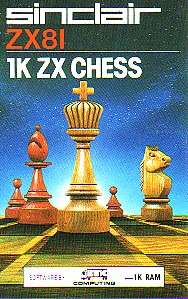1K ZX Chess
| 1K ZX Chess | |
|---|---|
|
Cover of Artic Computing's 1K ZX Chess | |
| Designer(s) | David Horne |
| Platform(s) | Sinclair ZX81 |
| Release date(s) | 1982[1] |
| Genre(s) | Turn-based strategy |
| Mode(s) | Single-player |
1K ZX Chess is a 1982 chess-playing computer program (while missing three rules) for the unexpanded Sinclair ZX81.
Description
1K ZX Chess uses only 672 bytes of RAM[2] but implements most chess rules (castling, promotion, and en passant capture are missing), and a computer opponent.[3] It was the smallest implementation of chess on any computer until its record was broken in January 2015 by the smallest completely new PC compatible BootChess,[4] although apparently artificial intelligence is lesser than the original.[5]
Developer David Horne discussed 1K ZX Chess and published the full source code in a series of articles in Your Computer in 1982 and 1983.[6][7][2]
Reception
Popular Computing Weekly in 1982 called 1K ZX Chess "one of the most interesting ZX tapes to pass through our office in recent weeks". It approved of the computer displaying moves while considering them and noted "the skills which went into writing a chess program in 1K of machine code. Is there anyone reading this who could even contemplate doing the same?" The magazine concluded, "Despite the limitations this is one cassette, at £3, which I would recommend."[8] Sinclair User in 1983 stated that "it takes some technical wizardry to squeeze this kind of game into the unexpanded ZX81". The magazine praised the game's quick loading speed, and found that it "makes its moves very fast for the amount of memory available for it".[3] Home Computing Weekly gave the game three out of five stars, criticizing the confusing user interface but stating that "it still produces play which needs some thought to beat".[9] Tim Harding wrote in a 1985 book on computer chess that "the man who did it must be some sort of genius". While describing 1K ZX Chess' quality of play as "so appalling that it would be hard to make it beat you" and criticizing the backward algebraic notation, he concluded that "the program is nevertheless a fantastic technical achievement".[10]
1K ZX Chess came in second place for best software in a poll of ZX81 users. Retrogaming Times Monthly described it as "history's greatest game programming feat";[11] Kuro5hin agreed, calling 1K ZX Chess "the greatest program ever written".[12]
See also
References
- ↑ Stokel-Walker, Chris (2015-09-20). "The bitter rivalry behind the world’s smallest chess program". The Kernel. The Daily Dot. Retrieved 2015-09-23.
In mid-1982, a small quarter-page advert appeared in a computer hobbyist magazine. For just £5 (about US$26.50 today), the ad’s pixelated block text promised a computer chess program with “absolutely flicker-free display” and an opponent who would make its move on average just six seconds after yours. “Sensational 1K ZX 81 Chess,” claimed the copy, and ignoring that today-inexplicable numerical assemblage, the important points are “sensational” and “chess.”
- 1 2 Horne, David (February 1983). "Full ZX-81 Chess in 1K". Your Computer. pp. 100–102. Retrieved 17 October 2013.
- 1 2 Gilbert, John (March 1983). "Sinclair acts to improve the standard of its named software". Sinclair User. pp. 62–63. Retrieved 28 January 2015.
- ↑ Kelion, Leo (2015-01-28). "Coder creates smallest chess game for computers". BBC News. Retrieved 27 January 2015.
- ↑ Mick, Jason. "World's Smallest Chess Code is a Cheating Novice (But Still Kind of Lovable)". Daily Tech.
- ↑ Horne, David (December 1982). "Chess in 1K". Your Computer. pp. 68–69. Retrieved 21 January 2015.
- ↑ Horne, David (January 1983). "1K Chess". Your Computer. pp. 81, 83. Retrieved 21 January 2015.
- ↑ Scot, Duncan (1982-07-15). "1K ZX Chess". Popular Computing Weekly. p. 12. Retrieved 1 February 2015.
- ↑ Elder, Ray (1983-03-08). "Which ZX81 programs are best?". Home Computing Weekly. pp. 21–22. Retrieved 1 February 2015.
- ↑ Harding, T. D. (1985). Price, Jill; Levy, David N. L., ed. The New Chess Computer Book. Pergamon Chess Series (2nd ed.). Pergamon Press. p. 161. ISBN 9781483140322.
- ↑ Sabbatini, Mark (January 2009). "The Thrill of Defeat: Catching the 1k Bug". Retrogames Times Monthly. Retrieved 21 January 2015.
- ↑ codemonkey_uk (2001-08-10). "The greatest program ever written". Kuro5hin. Retrieved 21 January 2015.
External links
- 1K ZX Chess at MobyGames
- Full ZX-81 Chess in 1K
- 1K ZX Chess at Chess Programming Wiki
- 1K ZX Chess ZX81 Collection entry with the original inlay scan and program listing. An emulator is available on the site to play the game online.
| ||||||||||||||||||||||||||||||||||||||
